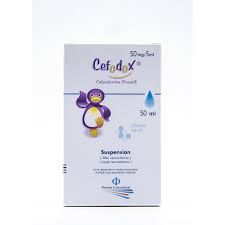Cefodox is an oral suspension that contains cefpodoxime proxetil, a third-generation cephalosporin antibiotic. The 50mg syrup formulation is commonly used to treat various bacterial infections, particularly in children.
Key Uses
Cefpodoxime is indicated for the treatment of:
- Respiratory Tract Infections: Such as pneumonia and bronchitis.
- Ear Infections: Including otitis media.
- Skin and Soft Tissue Infections: Effective against infections of the skin and underlying tissues.
- Urinary Tract Infections (UTIs): Treats infections of the urinary system.
- Gonorrhea: Used for treating uncomplicated gonococcal infections.
Mechanism of Action
Cefpodoxime works by inhibiting bacterial cell wall synthesis, which is essential for bacterial growth and survival. This action leads to the weakening and eventual death of the bacteria, helping to clear the infection.
Dosage and Administration
- Adults: The usual dosage is typically 200 mg every 12 hours, depending on the type and severity of the infection.
- Children: For pediatric patients, the dosage is usually based on weight, often calculated as 10 mg/kg/day, divided into two doses.
The syrup should be shaken well before use and can be taken with or without food. Taking it with food may help enhance absorption and reduce gastrointestinal discomfort.
Side Effects
Common side effects may include:
- Nausea
- Vomiting
- Diarrhea
- Abdominal pain
- Rash
Serious side effects can include severe allergic reactions, liver dysfunction, and Clostridium difficile-associated diarrhea.
Warnings and Precautions
- Contraindications: Not suitable for individuals with known hypersensitivity to cefpodoxime or other cephalosporins. Caution is advised in patients with a history of penicillin allergy.
- Pregnancy and Breastfeeding: Consult a healthcare provider before use if pregnant or breastfeeding.
- Renal Impairment: Dosage adjustments may be necessary for patients with kidney issues.
Storage
Store Cefodox syrup at room temperature (below 25°C), away from moisture and direct sunlight. After reconstitution, it should typically be refrigerated and used within a specified period (usually within 14 days).



